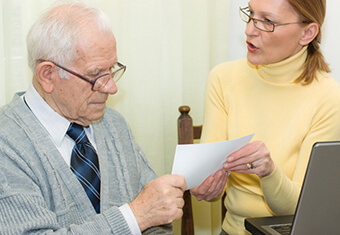Although it has not been possible to make a new Enduring Power of Attorney (EPA) since 1 October 2007, existing EPAs continue to be valid. So, if you have been appointed as an attorney under an EPA made before then, you can still use it to act on the donor’s behalf to manage his or her finances.
When can I act under the EPA?
If the donor is physically incapable but has mental capacity, then you can act under the EPA straightaway and manage the donor’s finances at his/her direction. You will need to take a certified copy of the EPA and your identification to the banks and other organisations where the funds are held.
If the donor is, or is becoming, mentally incapable, then you must register the EPA with the Office of the Public Guardian (OPG) to be able to act under it.
How do I register an EPA?
Registration is a two-step process. Firstly, you need to tell the donor and at least three of his/her relatives (and in some cases also your co-attorneys) that you intend to register the EPA using form EP1PG. Secondly, you then apply to register the EPA to the OPG.
Step one: notifying the donor
You must personally notify the donor and explain what it implies. If it is difficult for you to visit the donor, for example at the present time with COVID-19, then the notice can be posted to care home staff to give to him/her. It is not necessary for the donor to understand the notice.
Notifying the donor’s relatives
At least three of the donor’s relatives must be notified. The categories in order of priority are the donor’s:
- Spouse or civil partner (including where separated, but not divorced)
- Children (including adopted children, but not stepchildren)
- Parents
- Siblings (including half-siblings)
- Child’s widow or widower, or surviving civil partner
- Grandchildren
- Nieces and nephews (children of full siblings)
- Nieces and nephews (children of half siblings)
- Aunts and uncles
- First cousins
If the donor has no family member in a category, then you move on to the next category. Once a category is reached, every person in the category must be notified, even if this would result in more than three relatives being notified.
If, as attorney, you also fall into the category of relatives to be notified, then you count as one of the three, but you do not need to send a notice to yourself.
If a relative is under 18 or mentally incapable, then they do not count as one of the three people to be notified.
The notice should be sent by post, but if that is not possible then the relative can give permission to accept the notice by email. However, they must reply to confirm that they have received it.
The purpose of the notice is to give the person a period in which to come forward if they object to the registration of the EPA. This could be, for example, because the attorney is unsuitable to act on the donor’s behalf, or because the EPA was made under undue pressure.
Step two: registering the EPA
Step two is completing the Application for Registration form (EP2PG) and submitting this to the OPG together with the registration fee of £82.
If you have been appointed to act ‘jointly’ with your co-attorneys, then you must all apply to register the EPA.
If you have been appointed to act ‘jointly and severally’ with your co-attorneys, then any one of you can apply to register the EPA, but you will need to notify your co-attorneys of the application.
What if the donor cannot afford the registration fee?
If the donor cannot afford the registration fee, you may be able to apply for a remission or exemption of the fee.
How long will registration take?
The EPA will usually be registered within ten weeks of the application having been made. If there are any objections or problems, these will need to be resolved before the EPA can be registered.
What powers do I have while the EPA is being registered?
You have limited powers to maintain the donor and prevent loss to his or her estate.
What happens once the EPA is registered?
Once the EPA is registered, then you will take over full responsibility from the donor for managing his or her property and financial affairs.
You should provide a certified copy of the EPA and your identification to the banks and other financial organisations used by the donor.
You have duties and responsibilities which include always acting in the best interests of the donor and considering the Mental Capacity Act and supporting Code of Practice when acting on their behalf. You also have a duty to keep accounts of your management of the donor’s funds.
Related articles
Alison Craggs TEP is a Senior Solicitor at The Burnside Partnership in Witney, Oxfordshire
 UK
UK  Canada
Canada

